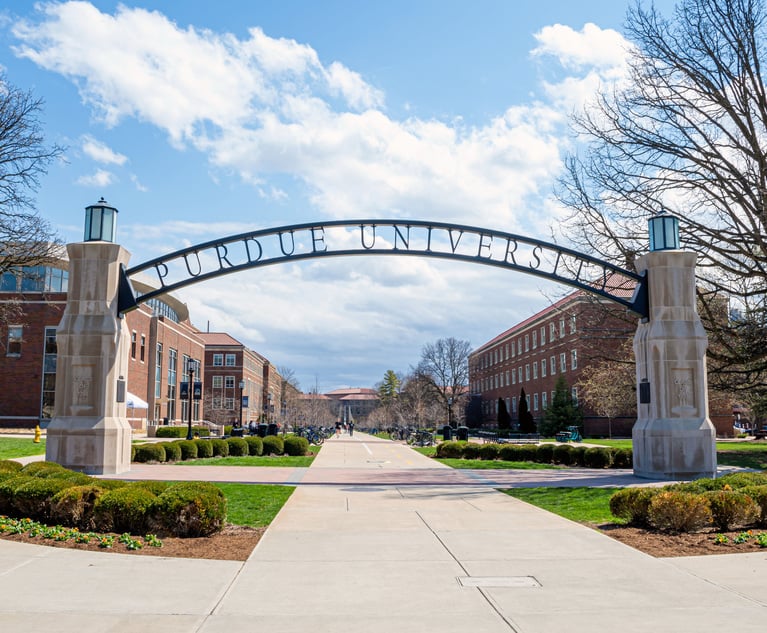Incoming Law Firm Associates Unsure When Their Jobs Will Start
A new survey by the National Association for Law Placement found that half of law firms have yet to set start dates for their new associate classes, in part due to uncertainty over when the bar exam will be given.
July 15, 2020 at 05:00 PM
3 minute read
Many law firm offices still don't know when they will be bringing on their new class of associates.
Half of law firm offices don't have an official start date for their incoming associates, according to a new survey by the National Association for Law Placement (NALP). And among the offices that have set start dates, 62% won't welcome their new lawyers until January 2021. That means hundreds of recent law graduates are in the dark about when their jobs will begin, and whether they should move for their new jobs.
"There's a lot of uncertainty right now," said NALP Executive Director James Leipold. "The bar exam is a moving target—even jurisdictions that have made decisions [about when to administer the exam] have had to make second and third decisions as the virus surges. So law firms are trying to plan start dates around when they can get licensed lawyers."
New associates typically start in August or September, after sitting for the July bar exam. But a growing number of jurisdictions have moved the test into September and October this year. Some law firms are staggering new associate start dates depending on when each associate is scheduled to take the bar, among other factors, Leipold said.
NALP surveyed more than 350 law firm offices and 167 law school career services offices in the second half of June on everything from associate start dates and summer associate programs to rescinded job offers and pay cuts during the COVID-19 pandemic.
Nearly half of career services offices—49%—reported that at least one graduate had seen their job offer rescinded. But rescinded offers have to this point been rare and concentrated at smaller firms, Leipold said. He said very few large firms have rescinded offers for incoming associates, in part because those firms faced significant shortages of midlevel associate talent for five years or so after gutting new associate classes during the 2008 recession, he noted. Instead, many firms are taking a wait-and-see approach to when new associates come on board.
"The other piece of the puzzle is the uncertainly about the volume of work, and wanting current associates to have the work now," Leipold said. "It seems that most firms that have deferred start dates have provided some sort of stipend—not a salary obviously—but some monetary compensation to help tide incoming associates over until January."
More precisely, 69% of the law firm offices that have deferred their incoming associate start dates are offering stipends or other cash payments, according to the survey.
On the law school side, 13% of career services offices reported that their schools had increased the amount of post-graduate fellowship funding available for the class of 2020 from the previous year, while 69% said that funding remained flat. Those fellowships give recent graduates the opportunity to take temporary legal jobs while getting paid by the school.
Nearly half of law school respondents—49%—said they have invested in new technology to facilitate virtual counseling, interviews and meetings. Another 21% of schools are considering making such investments. Among career services offices that have established operational plans for the coming academic year, 61% plan to offer a combination of virtual and in-person services, the survey found. But half of the responding law school career services said they experienced budget cuts between March and June of this year, and 58% anticipate more cuts in the coming year.
This content has been archived. It is available through our partners, LexisNexis® and Bloomberg Law.
To view this content, please continue to their sites.
Not a Lexis Subscriber?
Subscribe Now
Not a Bloomberg Law Subscriber?
Subscribe Now
NOT FOR REPRINT
© 2025 ALM Global, LLC, All Rights Reserved. Request academic re-use from www.copyright.com. All other uses, submit a request to [email protected]. For more information visit Asset & Logo Licensing.
You Might Like
View All
Librarian's Termination Violated First Amendment Protections, Lawsuit Claims
3 minute read
After Shutting USAID, Trump Eyes Department of Education, CFPB

Divided State Supreme Court Clears the Way for Child Sexual Abuse Cases Against Church, Schools

Longtime Purdue GC Accused of Drunken Driving Hires Big-Name Defense Attorney
3 minute readTrending Stories
- 1With AI Expected to Be a Focus This Year, What Changes Can Midsize Firms Expect?
- 2Dissenter Blasts 4th Circuit Majority Decision Upholding Meta's Section 230 Defense
- 3NBA Players Association Finds Its New GC in Warriors Front Office
- 4Prenuptial Agreement Spousal Support Waivers: Proceed With Caution
- 5DC Circuit Keeps Docs in Judge Newman's Misconduct Proceedings Sealed
Who Got The Work
J. Brugh Lower of Gibbons has entered an appearance for industrial equipment supplier Devco Corporation in a pending trademark infringement lawsuit. The suit, accusing the defendant of selling knock-off Graco products, was filed Dec. 18 in New Jersey District Court by Rivkin Radler on behalf of Graco Inc. and Graco Minnesota. The case, assigned to U.S. District Judge Zahid N. Quraishi, is 3:24-cv-11294, Graco Inc. et al v. Devco Corporation.
Who Got The Work
Rebecca Maller-Stein and Kent A. Yalowitz of Arnold & Porter Kaye Scholer have entered their appearances for Hanaco Venture Capital and its executives, Lior Prosor and David Frankel, in a pending securities lawsuit. The action, filed on Dec. 24 in New York Southern District Court by Zell, Aron & Co. on behalf of Goldeneye Advisors, accuses the defendants of negligently and fraudulently managing the plaintiff's $1 million investment. The case, assigned to U.S. District Judge Vernon S. Broderick, is 1:24-cv-09918, Goldeneye Advisors, LLC v. Hanaco Venture Capital, Ltd. et al.
Who Got The Work
Attorneys from A&O Shearman has stepped in as defense counsel for Toronto-Dominion Bank and other defendants in a pending securities class action. The suit, filed Dec. 11 in New York Southern District Court by Bleichmar Fonti & Auld, accuses the defendants of concealing the bank's 'pervasive' deficiencies in regards to its compliance with the Bank Secrecy Act and the quality of its anti-money laundering controls. The case, assigned to U.S. District Judge Arun Subramanian, is 1:24-cv-09445, Gonzalez v. The Toronto-Dominion Bank et al.
Who Got The Work
Crown Castle International, a Pennsylvania company providing shared communications infrastructure, has turned to Luke D. Wolf of Gordon Rees Scully Mansukhani to fend off a pending breach-of-contract lawsuit. The court action, filed Nov. 25 in Michigan Eastern District Court by Hooper Hathaway PC on behalf of The Town Residences LLC, accuses Crown Castle of failing to transfer approximately $30,000 in utility payments from T-Mobile in breach of a roof-top lease and assignment agreement. The case, assigned to U.S. District Judge Susan K. Declercq, is 2:24-cv-13131, The Town Residences LLC v. T-Mobile US, Inc. et al.
Who Got The Work
Wilfred P. Coronato and Daniel M. Schwartz of McCarter & English have stepped in as defense counsel to Electrolux Home Products Inc. in a pending product liability lawsuit. The court action, filed Nov. 26 in New York Eastern District Court by Poulos Lopiccolo PC and Nagel Rice LLP on behalf of David Stern, alleges that the defendant's refrigerators’ drawers and shelving repeatedly break and fall apart within months after purchase. The case, assigned to U.S. District Judge Joan M. Azrack, is 2:24-cv-08204, Stern v. Electrolux Home Products, Inc.
Featured Firms
Law Offices of Gary Martin Hays & Associates, P.C.
(470) 294-1674
Law Offices of Mark E. Salomone
(857) 444-6468
Smith & Hassler
(713) 739-1250









